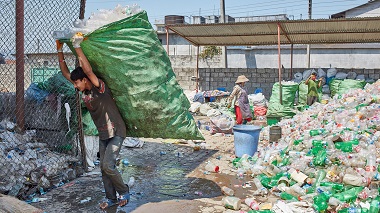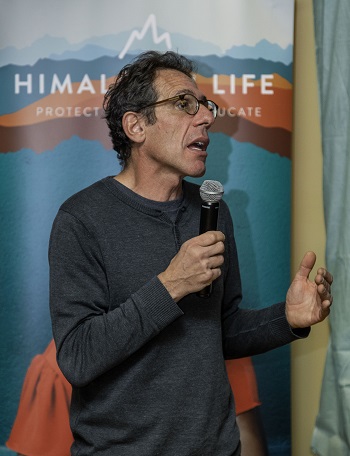
Daniel Burgi and Joyce Azzam are working together on Mountain Plastic. Photo by Fred Meyerink.
The match between Joyce Azzam and a group which works with marginalized youth in Nepal must have been made in heaven – or at least close to heaven, in the Himalayan mountains.
Joyce Azzam grew up in Lebanon as a girl with big dreams – some of which she has now realized.
Having completed the Seven Summits Challenge (climbing the highest mountain in each of the seven continents) last May when she successfully scaled Mount Everest, she now plans to be the third women ever to complete the Explorers Grand Slam, by adding visits to both the North and South Poles.
Azzam is in Vancouver this week to confront another challenge, one related to her career, and to a passion conceived while on the flanks of Mount Everest. Trained as a conservation architect (with a PhD in landscape and environment), one of her key projects is MounTurtle, through which she strives to “protect the mountain” and empower the Sherpa people of Nepal.
Mountain Plastic
Azzam will speak at Mountain Plastic: Powered by Himalayan Life this Saturday (February 22) at Granville Chapel.
She and Himalayan Life founder and CEO Daniel Burgi will attest to the urgency of combating plastic pollution in the Himalayas and will describe how education for children and plastic recycling can go hand-in-hand.
Himalayan Life is “a Christian charity that exists to enhance the lives of children in the Himalayas.”
Burgi, originally from Switzerland, first went to Nepal 28 years ago, before coming to Vancouver to complete two masters degrees at Regent College. For the past 10 years he has been caring for street children and socio-economically disadvantaged children following Nepal’s civil war. (He and his wife and two college-age children now consider Vancouver home, though he spends about eight months each year overseas, mainly in Nepal.)

Three tons of bottles are brought to the Himalayan Life Plastics Plant each day.
Misti Hurst, a Himalayan Life team member, wrote this as part of an article that will appear in The Light magazine in March:
While most of the money required to pay for these programs comes from direct donations to Himalayan Life, staff there have figured out how to make it more sustainable by creating the only plastic bottle (PET) recycling plant in Nepal to help fund their projects.
Mountain Plastic powered by Himalayan Life is a social enterprise based in Pokhara, Nepal committed to the sustainable transformation of people and the planet.
Recycling over 60 million plastic bottles annually, they also generate over 5,000 tons of carbon offsets. Post-consumer bottles are systematically segregated by hand then processed by state-of-the-art technology. These recycled bottles produce the highest quality food-grade rPET granulate which can then be used for bottle-to-bottle recycling and activewear.
Jobs are given not to those with highest qualifications but to those with the greatest need.
Fortuitous meeting

Joyce Azzam was upset by the amount of plastic trash she saw on Mount Everest. Photo by Fred Meyerink.
Speaking at another Himalayan Life gathering at Steamworks in Gastown February 19, Azzam explained how she came to have a particular interest in the Himalayas, given that she has climbed the highest peaks on every continent.
She recalled that when she was climbing the Khumbu Icefall, which lies at an altitude of 5,486 metres on the Nepali slopes of Mount Everest, she saw a lone plastic bottle of Sprite, “lying in the melting water of the icefall – this picture just stayed with me.”
She added that Camp 4, at 7,900 metres, “should be one of the most pristine places, but it’s full of trash.” Back at Base Camp, she stayed on an extra night, meditating on what she could do about the situation, in light of her professional expertise and concerns.
Not too long afterwards, Azzam met a Nepali woman, Lakpa Phuti Sherpa, and they decided create ‘Everest Voices’ and clean up Camp 4. Sherpa happened to meet Markku Kostamo (chief growth officer of Himalayan Life, but still known best in this area as co-founder of A Rocha Canada) and introduced him to Azzam.
Everest Base Camp Expedition
Now Azzam, who told me she is a Catholic Christian, has joined forces with Himalayan Life for an Everest Base Camp Expedition, set for this spring.
Burgi said during the February 19 gathering that even though he has been in Nepal for more than 25 years “Mount Everest still seems so out of reach.” But following a visit to Everest Base Camp last October, he decided to make a first step in cleaning up the mountain, and strapped hundreds of bottles to his backpack when he left.

Daniel Burgi recently carried plastic bottles away from Everest Base Camp on his back. Photo by Fred Meyerink.
Hurst wrote:
In April of this year, Azzam along with Kostamo, will embark on a challenging adventure to help recover Mountain Plastic from the Everest area.
Joining them will be over a dozen street boys from Pokhara embarking on a life-changing adventure of not only recovering plastic but grappling with addictions and trauma in real time. Expedition dates are March 28 – April 16.
This expedition will not only uncover and remove mountain plastic from Everest, but will also act as a charity fundraiser. The elevation of Everest is 29,029 feet and so their goal for Team Everest is $29,029 in monthly giving. Generous donors have offered matching funds already so that every dollar is doubled.
The Everest region is expecting close to 40,000 visitors this year alone, and the problem of mountain plastic is only going to get worse unless something is done about it.
This Saturday evening (February 22) at Granville Chapel, Joyce Azzam will describe some of her journey, including her Seven Summits achievement, then she and Daniel Burgi will explain how their Mountain Plastic partnership came about, and what they hope to achieve for the environment and for disadvantaged youth in Nepal.
